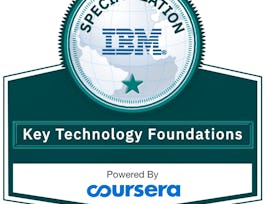Manufacturers are increasingly utilizing machine tools that are self-aware – they perceive their own states and the state of the surrounding environment – and are able to make decisions related to machine activity processes. This is called intelligent machining, and through this course students will receive a primer on its background, tools and related terminology.


Intelligent Machining
This course is part of Digital Manufacturing & Design Technology Specialization

Instructor: Rahul Rai
Sponsored by Pontificia Universidad Católica del Perú
30,116 already enrolled
(1,367 reviews)
Details to know

Add to your LinkedIn profile
16 assignments
See how employees at top companies are mastering in-demand skills

Build your subject-matter expertise
- Learn new concepts from industry experts
- Gain a foundational understanding of a subject or tool
- Develop job-relevant skills with hands-on projects
- Earn a shareable career certificate


Earn a career certificate
Add this credential to your LinkedIn profile, resume, or CV
Share it on social media and in your performance review

There are 4 modules in this course
The purpose of this module is to introduce the concepts related to intelligent machining paradigm. The key focus will be discussing two key components of intelligent machining, i.e., sensing and control.
What's included
4 videos4 readings4 assignments
The purpose of this module is to introduce spectrum of sensors used to implement intelligent machining. The module will also discuss the basics of signal processing and analysis techniques that has brought intelligent machining paradigm closer to industrial realization. Following issues pertaining to sensors and sensing techniques will be elaborated up: (1) Which sensors are to be used in each application? (2) How to acquire and process sensor signals?
What's included
4 videos3 readings5 assignments1 discussion prompt
The purpose of this module is to introduce the concept of Programmable Logic Controllers (PLCs) that co-ordinate the real-time control functions.
What's included
4 videos4 readings5 assignments
The purpose of this module is to introduce the background related to open architecture software systems to implement intelligent machining.
What's included
3 videos5 readings2 assignments1 discussion prompt
Instructor

Why people choose Coursera for their career




Learner reviews
1,367 reviews
- 5 stars
71.90%
- 4 stars
22.01%
- 3 stars
4.16%
- 2 stars
1.02%
- 1 star
0.87%
Showing 3 of 1367
Reviewed on Jun 7, 2020
Very good and Interesting course Intelligent Machining .Gives you greatly overall knowledge about machining and manufacturing.
Reviewed on May 28, 2020
It was a good experience in their course which is very useful also give the information how the used of intelligent machining in industry
Reviewed on May 25, 2020
Intelligent Machining my review is Good learning for future and new technologies are deep learning. Thank you coursera for important information information with quarantine life.
Recommended if you're interested in Physical Science and Engineering


University of Michigan


University of Michigan


Indian Institute of Technology Guwahati

Open new doors with Coursera Plus
Unlimited access to 10,000+ world-class courses, hands-on projects, and job-ready certificate programs - all included in your subscription
Advance your career with an online degree
Earn a degree from world-class universities - 100% online
Join over 3,400 global companies that choose Coursera for Business
Upskill your employees to excel in the digital economy







